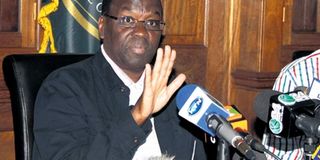Judiciary in plan to freeze new cases

Chief Justice Willy Mutunga at a past event. Lawyers in Mombasa on July 27, 2015 launched a bid to kick him out over alleged skewed posting of judges and magistrates. FILE PHOTO |
What you need to know:
- It is estimated that the Judiciary needs three years to clear all the cases in the court system.
- The CJ said the situation was worse in the High Court, where 12 years were required to clear all the pending cases.
The Judiciary is considering freezing admission of new matters and assigning only a limited number of judges to handle urgent ones in a bid to clear the huge case backlog.
Chief Justice Willy Mutunga said although courts had made strides in tackling the backlog, estimated at over one million a few years ago, it was necessary to take drastic measures to solve the problem.
“I have instructed Mr Justice Daniel Musinga, who heads the performance management committee and the Judicial Training Institute, to convene a meeting on the case backlog, whose recommendation may entail suspending the admission of new matters,” said Dr Mutunga.
LOW CAPACITY
“These are some of the proposals I wish to put before you (judges) for debate because the Judiciary is reeling under these pending cases and the low capacity of the courts to clear them,” he added.
The CJ spoke at the opening of the annual Judges Conference at the Safari Park Hotel in Nairobi on Monday.
It is estimated that the Judiciary needs three years to clear all the cases in the court system.
The CJ said the situation was worse in the High Court, where 12 years were required to clear all the pending cases.
Citing a recent case audit, Dr Mutunga said: “As at June 30 last year, there were 426,508 pending cases in the court system. Of these, 332,420 were civil and 94,078 criminal.
“Magistrates’ courts had the highest number of pending cases at 276,577.”
Dr Mutunga said when the new session opens, resident judges and heads of divisions would have job descriptions and clear terms of reference for which they need to sign. This is among a raft of measures the Judiciary will take to enhance efficiency.
At the same time, Dr Mutunga said it was sad that even after the rigorous vetting of judicial officers, the Judiciary was still dogged by allegations of corruption.
“The JSC has taken the war on corruption a notch higher by establishing an investigation unit to complement what official anti-graft agencies are doing,” said Dr Mutunga.




